
May 26
1879 Birth: Sir Maxwell Aitken, 1st Baron Beaverbrook: British politician and journalist:
[A] financier in Canada, politician and newspaper proprietor in Great Britain, one of three persons (the others were Winston Churchill and John Simon) to sit in the British cabinet during both World Wars. An idiosyncratic and successful journalist, he never fully achieved the political power that he sought.
As a stockbroker in Montreal, Aitken made a fortune by amalgamating the entire cement industry of Canada. He then moved to England and was elected to the House of Commons in 1910. As private secretary to Andrew Bonar Law (also Canadian-born), he helped him win the Conservative Party leadership in 1911. He also worked with Law to remove the Liberal H.H. Asquith as prime minister in favour of the Liberal David Lloyd George in December 1916. In the same month, Aitken bought a majority interest in the London Daily Express. Subsequently he founded the London Sunday Express and acquired the London Evening Standard (which then absorbed a noted Liberal paper, the Pall Mall Gazette) and the Glasgow Evening Citizen.
After failing to receive government office from Lloyd George in 1916, Aitken accepted a baronetcy in that year and a peerage as Baron Beaverbrook the following year. In 1918 he served in the cabinet as chancellor of the duchy of Lancaster and minister of information. He aided in breaking up Lloyd George's postwar coalition in 1922, and in 1930-31 he tried unsuccessfully to overthrow Stanley Baldwin as Conservative leader. During the 1930s he was notable as one of the “press lords†and as a leader of the United Empire Party. In 1938, after Neville Chamberlain made a peace deal with Germany, Aitken's Express printed a headline that would haunt it for years, a lesson for journalists venturing into prediction: "Britain will not be involved in a European war this year or the next year either." But the war did come, and Aitken became a member of Winston Churchill's war cabinet as minister of aircraft production (1940-41) and minister of supply (1941-42). He also served as British lend-lease administrator in the United States (1942) and lord privy seal (1943-45).
In his newspapers Beaverbrook colourfully championed individual enterprise and British imperial interests. He also wrote several books about his political experiences, the most important being Politicians and the Press (1925) and Politicians and the War, 2 vol. (1928). He was caricatured in Evelyn Waugh's novel Scoop (1938). [Britannica.com.]
1889 Birth: Igor Sikorsky: Russian-born American aircraft designer; developed the helicopter
1896 Czar Nicholas II crowned:
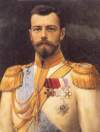
Nicholas II, the last czar, is crowned ruler of Russia in the old Ouspensky Cathedral in Moscow.
Nicholas was neither trained nor inclined to rule, which did not help the autocracy he sought to preserve in an era desperate for change. Born in 1868, he succeeded to the Russian throne upon the death of his father, Czar Alexander III, in November 1894. That same month, the new czar married Alexandra, a German-born princess who came to have great influence over her husband. After a period of mourning for his late father, Nicholas and Alexandra were crowned czar and czarina in May 1896.
As the ruler of Russia, Nicholas resisted calls for reform and sought to maintain czarist absolutism; although he lacked the strength of will necessary for such a task. The disastrous outcome of the Russo-Japanese War led to the Russian Revolution of 1905, which Nicholas only diffused after approving a representative assembly—the Duma—and promising constitutional reforms. The czar soon retracted these concessions and repeatedly dissolved the Duma, contributing to the growing public support enjoyed by the Bolsheviks and other revolutionary groups.
In 1914, Nicholas led his country into another costly war—World War I—and discontent grew as food became scarce, soldiers became war-weary, and devastating defeats at the hands of Germany demonstrated the ineffectiveness of Russia under Nicholas. In 1915, the czar personally took over command of the army, leaving the Czarina Alexandra in control at home. Her unpopular court was dominated by the Russian mystic Rasputin, who replaced the czar's competent ministers and officials with questionable nominees.
In March 1917, the army garrison at Petrograd joined striking workers in demanding socialist reforms, and Nicholas II was called on to abdicate. On March 15, he renounced the throne in favor of his brother Michael, whose refusal of the crown brought an end to the czarist autocracy in Russia. Nicholas, his wife, and children were held at the Czarskoye Selo palace by Russia's Provincial Government and in August moved to Tobolsk in Western Siberia under pressure from the Petrograd Soviet, the powerful coalition of soldiers' and workers' councils that shared power with the Provincial Government in the first stage of the Russian Revolution.
In November 1917, the Bolsheviks led by Vladimir Lenin seized power in Russia and set about establishing the world's first communist state. In April 1918, Nicholas and his family were transferred to Yekaterinburg in the Urals, which sealed their doom. Civil war broke out in Russia in June 1918, and in July the anti-Bolshevik "White" Russian forces advanced on Yekaterinburg during a campaign against the Bolshevik forces. Local authorities were ordered to prevent a rescue of the Romanovs, and after a secret meeting by the Yekaterinburg Soviet, a death sentence was passed on the imperial family.
Just after midnight on July 17, Nicholas, Alexandra, their five children, and four family retainers were ordered to dress quickly and go down to the cellar of the house in which they were being held. There, the family and servants were arranged in two rows for a photograph they were told was being taken to quell rumors that they had escaped. Suddenly, a dozen armed men burst into the room and gunned down the imperial family in a hail of gunfire.
The remains of Nicholas, Alexandra, and three of their children were excavated in a forest near Yekaterinburg in 1991 and positively identified two years later using mtDNA fingerprinting. The Crown Prince Alexei and one Romanov daughter were not accounted for, fueling the persistent legend that Anastasia, the youngest Romanov daughter, had survived the execution of her family. Of the several "Anastasias" that surfaced in Europe in the decade after the Russian Revolution, Anna Anderson, who died in the United States in 1984, was the most convincing. In 1994, however, scientists used mtDNA to prove that Anna Anderson was not Anastasia but a Polish woman named Franziska Schanzkowska. (History.com)
1903 Birth: Otto Abetz: German Ambassador to Vichy France:

Abetz will regard anti-Semitism as a necessary means of undermining the grip of the army and Church in Vichy and will suggest the expulsion of all emigrants and stateless Jews to the Free Zone. In July 1949, he will be sentenced by a Paris military tribunal to twenty years hard labor, as a war criminal. He will be released in 1954, and will burn to death in an automobile 'accident' on the Cologne-Ruhr autobahn in 1958, when something will go wrong with the steering wheel of his car. It is suspected that his death is a revenge killing for his role in sending French Jews to the gas chambers. [For further details, Click here.]
1913 Various:
Birth: Richard Dimbleby:
He was born at Richmond in Surrey . . . . the son of Frederick, a journalist, and his wife Gwendoline (Bolwell). He began his career as a reporter and was taken on by the BBC where he was one of the first people to introduce eye witness reports of incidents in the news. In 1939 he reported on the royal tour of Canada and became a war correspondent for the BBC in the same year. He witnessed action in North Africa, the Middle East and Greece and flew in a bomber on a raid on Berlin. Later he reported the crossing of the Rhine after D-Day and made broadcasts from Berlin and Belsen concentration camp on its liberation. He worked on radio and television and presented the first TV programme to be made inside the Abbey in 1952. His hushed tones were heard on coverage of the 1953 coronation from his position high in a commentary box in the Abbey triforium. [For further information, click here.]
Hitler in Munich:

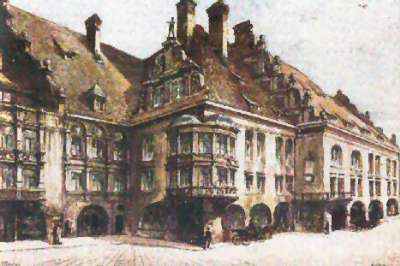
Frau Popp:
Next morning [May 26, 1913], my Herr Hitler went out; and came back again in no time, with an easel he had picked up somewhere. He began his painting straight away, and stuck to his work for hours. In a couple of days I saw two lovely pictures finished and lying on the table, one of the cathedral [the Frauenkirche‑-Cathedral of Our Dear Lady‑-at Marienplatz] and the other of the Theatinerkirche [the Roman Catholic Theatine Church of St. Cajetan at the Odeonsplatz]. After that, my lodger used to go out early of a morning, with his portfolio under his arm, in search of customers.

Courtyard of the Old Residency by Hitler
Frau Popp will testify that Hitler mostly kept to himself and had no friends‑-except for Rudolf Haeusler, his 19 year-old friend, for the first few months‑-though he did occasionally receive a letter from somebody she gathered was a sister in Vienna. While he was friendly with her two children, who liked their boarder very much, he resisted invitations to dine with the Popps, and spent most of his time holed up in his room, either reading, painting, or drawing. [For further details, Click here.]
1914 Countdown to World War I: Gavrilo Princip sets out from Belgrade for Sarajevo:

On May 26, 1914, 19-year-old Gavrilo Princip sets out from Belgrade on a 10-day-long journey through rough countryside, heading towards Sarajevo and a planned rendezvous with fellow young nationalist agitators.
Born in 1894 in the hamlet of Gornji Obljaj in western Bosnia, near Dalmatia, Princip was a Bosnian Serb who left home when he was 13 to study in Sarajevo, the Bosnian capital. Slight and frail, he volunteered for Serbian military service in the Balkan wars in 1912 and 1913, but was turned down by an officer who told him he was too weak. Bitterly disappointed, Princip found refuge in radical nationalism, joining on with the so-called Young Bosnia movement, a loose grouping of students and apprentices with revolutionary aspirations.
When Princip and his comrades learned in the spring of 1914 of the upcoming visit by Archduke Franz Ferdinand, heir to the throne of the Austro-Hungarian Empire, to Sarajevo that June, they hatched a plan to assassinate him. Such plots had been attempted before, most recently the previous January, and had failed. As a prominent symbol of the Austrian regime, Franz Ferdinand was a likely target for Slavic nationalists angry over the Austrian annexation of Bosnia-Herzegovina in 1908 and anxious about the possibility of further aggression by the empire in the Balkans; in fact, Franz Ferdinand was the leading advocate for peace and restraint within his country's political and military establishment.
With weapons—including bombs, revolvers and cyanide capsules with which to commit suicide after their murderous work was done—supplied by members of the shadowy Serbian terrorist organization Narodna Odbrana (the Black Hand), Princip left Belgrade on May 26, 1914, and traveled through secret channels, also facilitated by the Black Hand, for nearly 10 days before meeting up with his fellow conspirators in Sarajevo. Less than a month later, on June 28, Franz Ferdinand and his wife Sophie made their official appearance in Sarajevo to review the maneuvers of the 15th and 16th Corps of the Austrian army. After a bomb thrown by Princip's cohort failed to achieve its deadly objective, rolling off the back of the royal car and wounding an officer and some bystanders, the archduke's procession took a wrong turn. Their car happened to stop on a corner where Princip was loitering; he fired on Franz Ferdinand and Sophie at point- blank range, killing them almost instantly and sparking a chain of complicated events that would lead not only Austria-Hungary and Serbia but a host of great and small nations in Europe and beyond into the devastating conflict that would become known as the First World War. (History.com)
1915 World War I: List Regiment:

Gefreiter Adolf Hitler's 16 Reserve Infantry Regiment continues to occupy a position at Fromelles (pictured above in a drawing by Hitler), which is on a level field with water channels, willow trees and willow stalks. In the distance towards the enemy lines lies an insignificant wood with barbed wire entanglements. Under the direction of their defense-minded commander, Lieutenant General Gustav Scanzoni von Lichtenfels, the regiment works ceaselessly day and night to further fortify their position at Fromelles while fighting off repeated assaults by the enemy. [For further details, Click here.]
Large-scale deportations of Armenians begin in Turkey:
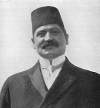
In the latest of a disturbing series of Turkish aggressions against Armenians during World War I, Mehmed Talat, the Ottoman minister of the interior, announces that all Armenians living near the battlefield zones in eastern Anatolia (under Ottoman rule) will be deported to Syria and Mosul. Large-scale deportations began five days later, after the decision was sanctioned by the Ottoman council of ministers. [For further information, click here.]
1916 World War I: List Regiment: Gefreiter Adolf Hitler endures trench warfare in Flanders (Artois) with 3 Company, 16 Reserve Infantry Regiment. [For further details, Click here.]
1917 World War I: List Regiment: Gefreiter Adolf Hitler's 16th RIR redeploy east of Douai for a period of rest which will extend until June 24. [For further details, Click here.]
1918 World War I: Various:
List Regiment: Gefreiter Adolf Hitler's 16th RIR is behind the lines for a period of rest that will last until May 30. [For further details, Click here.]
Georgia: The Georgian Social Democratic Republic declares independence from Russia.
1923 Death: Albert Leo Schlageter Nazi martyr: Surprise eulogy:
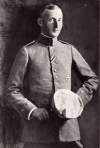
On this date in 1923, a German paramilitary was shot by a French firing squad near Dusseldorf for his anti-occupation sabotage efforts.
Albert Leo Schlageter, a World War I veteran and conservative Catholic who signed up with the right-wing Freikorps and tangled with communists after the war, joined the fledging Nazi party when it absorbed his Freikorps unit in 1922.
The next year, France occupied the Ruhr to secure war reparations payments then crippling Germany, which would do much to speed the rise of the Nazis in the years ahead. Schlageter was nabbed sabotaging railroad lines in resistance, and Berlin's protests didn't help him much.
He became a Nazi martyr literally overnight, and as the nationalist right ascended, the place of his passion was marked with a 90-foot cross and used for party rallies. His name christened a naval vessel, a Luftwaffe fighter wing, two SA units, and several Nazi badges and decorations . . . .
Unsurprisingly, Schlageter's cult has waned into obscurity since 1945. But one needs not endorse his philosophy or its horrifying posthumous expressions to appreciate the man's struggle against foreign occupation and bravery in what he took to be the country's interests.
For the Communist Karl Radek, this martyr of the right stood for many more whose sincere intentions had been bent against themselves — "those German Fascisti, who honestly thought to serve the German people." Addressing the Communist International's Executive Committee in the days after the officer's execution, Radek anticipated Schlageter pointing the way to a future very different from that which came to pass:
"Schlageter, a courageous soldier of the counter-revolution, deserves to be sincerely honoured by us, the soldiers of the revolution . . . . Schlageter went . . . to the Ruhr, not in the year 1923 but in the year 1920. Do you know what that meant? He took part in the attack of German capital upon the Ruhr workers; he fought in the ranks of the troops whose task it was to bring the miners of the Ruhr under the heel of the iron and coal kings. The troops of Waters, in whose ranks he fought, fired the same leaden bullets with which General Degoutte quelled the Ruhr workers. We have no reason to believe that it was from selfish motives that Schlageter helped to subdue the starving miners.
"The way in which he risked his life speaks on his behalf, and proves that he was convinced he was serving the German people . . . .
"[The German Communist Party] believe[s] that the great majority of the nationalist-minded masses belong not to the camp of the capitalists but to the camp of the workers. We want to find, and we shall find, the path to these masses. We shall do all in our power to make men like Schlageter, who are prepared to go to their deaths for a common cause, not wanderers into the void, but wanderers into a better future for the whole of mankind; that they should not spill their hot, unselfish blood for the profit of the coal and iron barons, but in the cause of the great toiling German people, which is a member of the family of peoples fighting for their emancipation . . . .
"Schlageter himself cannot now hear this declaration, but we are convinced that there are hundreds of Schlageters who will hear it and understand it."
1924 United States: Coolidge signs stringent immigration law: Ironic monument:
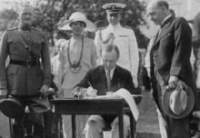
The new law reflected the desire of Americans to isolate themselves from the world after fighting the terrible First World War in Europe, which exacerbated growing fears of the spread of communist ideas. It also reflected the pervasiveness of racial discrimination in American society at the time. Many Americans saw the enormous influx of largely unskilled, uneducated immigrants during the early 1900s as causing unfair competition for jobs and land. Under the new law, immigration remained open to those with a college education and/or special skills, but entry was denied to Mexicans, and disproportionately to Eastern and Southern Europeans and Japanese. At the same time, the legislation allowed for more immigration from Northern European nations such as Britain, Ireland and Scandinavian countries. A quota was set that limited immigration to two percent of any given nation's residents already in the U.S. as of 1890, a provision designed to maintain America's largely Northern European racial composition. In 1927, the "two percent rule" was eliminated and a cap of 150,000 total immigrants annually was established.
The law particularly angered Japan, which in 1907 had forged with U.S. President Theodore Roosevelt a "Gentlemen's Agreement," which included more liberal immigration quotas for Japan. By 1924, strong U.S. agricultural and labor interests—particularly from California, which had already passed its own exclusionary laws against Japanese immigrants—favored the more restrictive legislation signed by Coolidge. The Japanese government viewed the American law as an insult, and protested by declaring May 26 a national day of humiliation in Japan. The law fanned anti-American sentiment in Japan, inspiring a Japanese citizen to commit suicide outside the American embassy in Tokyo in protest.
Despite becoming known for such isolationist legislation, Coolidge also established the Statue of Liberty as a national monument in 1924. (History.com)
[See: Countdown to Infamy: Timeline to Pearl Harbor.]1927 Various:
Communism: Diplomatic relations between Great Britain and Russia are temporarily disrupted because of friction caused by Communist agitation in clear violation of treaty agreements.
Last day of Model T production at Ford:

Henry Ford and his son Edsel drive the 15 millionth Model T Ford out of their factory, marking the famous automobile's official last day of production. [For further details, Click here. Note: Henry Ford was a notorious and accomplished antisemite, on a par with Streicher, and with a wider circulation. Hitler's inspiration for the idea of Volkswagen—a 'People's Car' was derived from the Model T; except that I doubt whether Ford defrauded his customers by embezzling their down payments..—Ed.]
1933 Holocaust: Some 1,200 Protestant clergymen in the US sign a manifesto protesting Nazi treatment of Jews and others.
1936 Austria announces its intention not to attend the Geneva conference on German refugees.
[See: Austria: The Other Germany.]1938 Subversives: The House Committee on Un-American Activities begins its work of searching for 'subversives' in the United States.
1939 Nazi-Soviet relations:

Joachim von Ribbentrop instructs Schulenburg to inform Molotov that Germany's hostility to the Comintern will be abandoned if Hitler can be assured that the Soviets have, in fact, renounced their aggressive struggle against Germany, as indicated by Stalin's recent speech.
1940 World War II: Various:
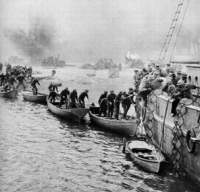
Operation Dynamo gets underway:
On May 26, the British Expeditionary Force was evacuated from Dunkirk in France. Ships arrived at Calais to remove the Force before German troops occupied the area, and it was hoped that 45,000 British soldiers could be shipped back to Britain within two days. The German air force, though, had other plans. Determined to prevent the evacuation, the Luftwaffe initiated a bombing campaign in Dunkirk and the surrounding area. British, Polish, and Canadian fighter pilots succeeded in fending off the German attack in the air, allowing finally for a delayed, but successful, evacuation nine days later. But the cost to civilians was great, as thousands of refugees fled for their lives to evade the fallout of the battle.
American President Franklin D. Roosevelt speaks on the radio:
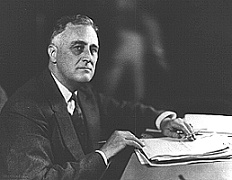
The president makes known the dire straits of Belgian and French civilians suffering the fallout of the British-German battle to reach the northern coast of France, and appeals for support for the Red Cross:
Tonight, over the once peaceful roads of Belgium and France, millions are now moving, running from their homes to escape bombs and shells and machine gunning, without shelter, and almost wholly without food. [For the full text of FDR's appeal, Click here.]
From the diary of General Franz Halder:
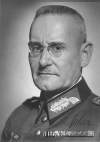
Brauchitsch is very nervy. I can sympathize with him, for these orders from the top make no sense. In one area they call for a head-on attack against a front retiring in orderly fashion, and elsewhere they freeze the troops to the spot where the enemy rear could be cut into at any time. Von Rundstedt, too, cannot stand it, and has gone up forward to Hoth and Kleist to look over the land for the next armored moves.
[See: What Were Adolf Hitler's Major Blunders?]1941 World War II: Various:
The Bismarck:The Polish destroyer Piorun exchanges fire with the German battleship Bismarck and signals its position to the British fleet.
British flying boat spots the Bismarck at 10:36 AM. Swordfish Torpedo-bombers from the Ark Royal score hits on the Bismarck, disabling her steering gear and rendering her un-maneuverable. This will enable the British destroyers to attack after dark. (McMurtrie)
Admiral Lutjens of the Bismarck sends out a radio message: "Ship un-maneuverable. We fight to the last shell. Long live the Fuehrer." (Baldwin, Brown)
Waffen-SS:
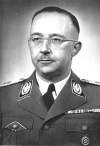
Himmler assigns a group of Waffen-SS to what he calls the Kommandostab Reichsfuehrer SS, which in effect becomes his own private army. (THP)
1942 World War II: Various:
Mutual Aid Treaty: Churchill and Molotov sign a twenty-year mutual aid treaty between Britain and the Soviet Union. (THP)
North Africa:
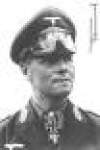
In Libya, General Rommel attacks the British Gazala Line, starting a drive from Libya that will soon take him to El-Alamein, 60 miles from Alexandria, Egypt.
South in an outflanking manouvre. The Allied commanders had been informed by ULTRA ... Rommel's intentions to attack and when, but not where and how.
[See: The Mediterranean Strategy.]Holocaust: From Emannuel Ringelblum's Notes from the Ghetto' (Ksuvim fun Geto):
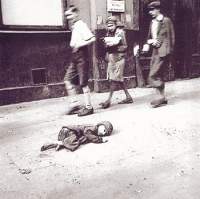
It remains a proven fact that the people fed in the soup-kitchens will all die if they eat nothing but the soup supplied and the dry rationed bread. The question thus arises whether it would not serve the purpose better to reserve the available money for selected individuals, for those who are socially productive, for the intellectual elite, etc. But the situation is such that, first of all, the numbers even of such select individuals is quite considerable, and there would not be sufficient even for them. Secondly, the question arises why should one pronounce judgment on artisans, laborers and other useful persons, who were productive people back in their small towns. And only the ghetto and war have turned them into non-people, into scrap, into human dregs. [For further details, Click here.]
1943 World War II: Stalin to FDR:

I agree that this summer, possibly as early as June, we should expect the Hitlerites to launch a major new offensive in the Soviet-German front. Hitler has already concentrated about 200 German divisions and up to 30 divisions of his allies for use against us. We are getting ready to repel the new German offensive and to launch counter-attacks, but we are short of aircraft and aircraft fuel.
Of course, it is at the moment impossible to foresee all the military and other steps that we may have to take. That will depend on the course of events on our front. A good deal will also depend on the speed and vigor with which Anglo-American military operations are launched in Europe. I have mentioned these important circumstances to explain why my reply to your suggestion for a meeting between us cannot be quite specific as yet. I agree that the time is ripe for such a meeting and that it should not be delayed. But I beg you to assess properly the importance of the circumstances I have referred to, because the summer months will be exceedingly trying for the Soviet armies.
As I do not know how events will develop on the Soviet-German front in June, I shall not be able to leave Moscow during that month. I therefore suggest holding the meeting in July or August. If you agree, I shall let you know two weeks before the date of the meeting just when it could be held in July or August. If, after being notified by me, you agree to the date suggested, I could arrive in time.
1944 World War II: Various:
Operation Knight's Move is launched:
Germany launches Operation Knight's Move, in an attempt to seize Yugoslav communist partisan leader Tito.
Using parachute drops and glider troops, German forces landed in the Yugoslavian village of Drvar, where Josep Broz Tito, leader of the anti-Axis guerilla movement, was believed to be. The village was decimated: Men, women, and children were all killed by German troops in search of Tito, who escaped.[For further information, click here.] Holocaust: Revolt at Auschwitz:Auschwitz
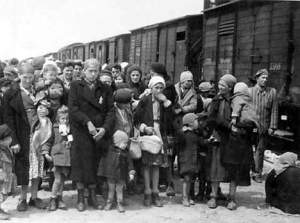
As several hundred Hungarian Jews were being led to a gas chamber in Birkenau (a supplementary camp, part of the Auschwitz complex known as Auschwitz II), the prisoners ran into the woods, suspecting their fate. Searchlights flooded the surrounding area, enabling the SS, who controlled the camp, to shoot all those who fled. This was the second such revolt in three days. FDR to Stalin:
I am sending you two scrolls for Stalingrad and Leningrad, which cities have won the wholehearted admiration of the American people. The heroism of the citizens of these two cities and the soldiers who so ably defended them has not only been an inspiration to the people of the United States, but has served to bind even more closely the friendship of our two nations.
Stalingrad and Leningrad have become synonyms for the fortitude and endurance which has enabled us to resist and will finally enable us to overcome the aggression of our enemies. I hope that in presenting these scrolls to the two cities you will see fit to convey to their citizens my own personal expressions of friendship and admiration and my hope that our peoples will continue to develop that close understanding which has marked our common effort.
Stalin to FDR:
Your communication on a statement to the people of Germany has reached me. In view of the experience of the war against the Germans and the German character I do not think that your suggested statement would have a positive effect, seeing that it is to be synchronized with the beginning of the landing and not with the moment when the Anglo-American landing and the forthcoming offensive of the Soviet armies will have registered notable success. As to the nature of the statement, we can return to this when circumstances favor publication.
1945 Various:
Burial: Heinrich Himmler:
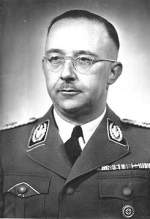
Corporal Jones later wrote of how he was part of a group who then buried Himmler before a truck drove back and forth across the grave to smooth it down.
He wrote: 'The place was not to be told to anyone for if some fanatical Germans got to hear about it they would have dug up the coffin and made a big parade with his body and made a martyr and worshipped (sic) him like a God.' [For further details, Click here.]

Paula Hitler: Adolf's sister is interrogated by US Army Intelligence officers at Berchtesgaden:
1948 Death: Theodore Morell: Hitler's personal physician from 1936 until 1945:
Morell was well known in Germany for his unconventional, holistic and alternative treatments. Although Morell had medical training and was licensed as a general practitioner in Germany long before he met Hitler, following World War II there were investigations into his practice along with interrogation by the Allies and he came to be widely regarded as a quack.
Historians have speculated his treatment contributed to Hitler's ill health. Morell was subject to many accusations by members of Hitler's inner circle. Several people claimed he regularly injected Hitler with morphine without telling him and that Morell himself was a morphine addict. Some went so far as to claim Morell used Hitler as a "guinea pig" for several of the drugs he tried to develop and sell but these latter claims were made by people without medical backgrounds and may not be reliable. [For further details, Click here.]
1955: From an NCS (National Security Council) Memorandum:
At the conclusion of Mr. Anderson's briefing, the President [Eisenhower] inquired whether any members of the Council wished to hear [any further details about] this project from Dr. Quarles, Assistant Secretary of Defense for Research and Development. At the invitation of the President, Dr. Quarles proceeded to describe the earth satellite in greater detail.
The Vice President [Nixon] inquired whether it would be possible, eventually, to develop an earth satellite [that] could stay up indefinitely. Dr. Quarles replied that it might be possible to do this at a later time.
Ambassador Lodge warned that the public relations aspects of establishing an earth satellite, as proposed in NSC 5520, should be very carefully worked out. Otherwise, the public relations effects could be harmful to the United States. Dr. Quarles replied that he thought that the [link to the International Geophysical Year,] which it was proposed that the U.S. use in launching the earth satellite, would be effective in meeting the problem cited by Ambassador Lodge.
1960 Cold War: United States charges Soviets with espionage:
During a meeting of the United Nations Security Council, U.S. ambassador to the United Nations Henry Cabot Lodge charges that the Soviet Union has engaged in espionage activities at the U.S. embassy in Moscow for years. The charges were obviously an attempt by the United States to deflect Soviet criticisms following the downing of an American U-2 spy plane over Russia earlier in the month. [For further details, Click here.]
1976 Death: Martin Heidegger: German philosopher and prominent member of the Nazi Party:
Philosophically, Heidegger attempted to reorient Western philosophy away from metaphysical and epistemological and toward ontological questions, that is, questions concerning the meaning of being, or what it means 'to be.'
Heidegger's defense of his Nazi involvement runs in two tracks: first, he argued that there was no alternative, saying that he was trying to save the university (and science in general) from being politicized and thus had to compromise with the Nazi administration. Second, he saw an "awakening" ("Aufbruch") which might help to find a "new national and social approach". After 1934, he said, he should have been more critical of the Nazi government. [For further details, Click here.]
2008 Death: Sidney Pollack : Film director, producer and actor:
He broke through in 1969 with They Shoot Horses, Don't They?, starring Jane Fonda. The bleak Great Depression-era film received nine Oscar nominations, including one for Pollack as Best Director. [For further details, Click here]
Edited by Levi Bookin (Copy editor)
levi.bookin@gmail.com



Click to join 3rdReichStudies




Disclaimer: This site includes diverse and controversial materials--such as excerpts from the writings of racists and anti-Semites--so that its readers can learn the nature and extent of hate and anti-Semitic discourse. It is our sincere belief that only the informed citizen can prevail over the ignorance of Racialist "thought." Far from approving these writings, this site condemns racism in all of its forms and manifestations.
Fair Use Notice: This site may contain copyrighted material the use of which has not always been specifically authorized by the copyright owner. We are making such material available in our efforts to advance understanding of historical, political, human rights, economic, democracy, scientific, environmental, and social justice issues, etc. We believe this constitutes a "fair use" of any such copyrighted material as provided for in section 107 of the US Copyright Law. In accordance with Title 17 U.S.C. Section 107, the material on this site is distributed without profit to those who have expressed a prior interest in receiving the included information for research and educational purposes. If you wish to use copyrighted material from this site for purposes of your own that go beyond 'fair use', you must obtain permission from the copyright owner.
Please Note: The list-owner and the moderator of 3rdReichStudies are not responsible for, and do not necessarily approve of, the random ads placed on our pages by our web server. They are the unfortunate price one pays for a 'free' website.